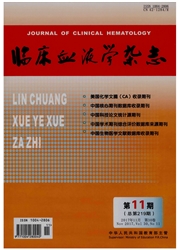

 中文摘要:
中文摘要:
目的:分析中国人种骨髓增生异常综合征(MDS)患者的骨髓细胞染色体异常特点,探讨细胞遗传学检测在我国MDS诊断及预后评估中的应用价值。方法:采用染色体核型分析结合荧光原位杂交(FISH)技术,检测84例MDS确诊病例的骨髓细胞染色体异常,将患者的骨髓细胞遗传学结合临床特点进行综合分析。结果:84例MDS患者中,存在骨髓细胞染色体异常者38例,占45.2%,其中+8、-7/7q-和20q-最常见,无单纯5q-者。具有预后良好染色体者55例,具有预后中等染色体者14例,具有预后不良染色体者15例。16例三系病态造血患者中染色体异常者10例(62.5%),其余68例患者中染色体异常者28例(41.2%),三系病态造血患者中染色体异常者比例似乎较高,但差异无统计学意义(P〉0.05)。经随访6~24个月,84例患者中已死亡29例。预后良好染色体组患者的生存时间高于预后不良染色体组(P〈0.01)。结论:中国人种MDS患者中,+8、-7/7q-和20q-为常见的染色体异常,单纯5q-罕见。细胞遗传学分析不仅应作为中国人种MDS诊断的重要依据,同时也是不可替代的预后评估指标。
 英文摘要:
英文摘要:
Objective: To analyze the cytogenetic features of Chinese patiens with myelodysplastic syndromes (MDS) and explore the value of cytogenetic analysis for the diagnosis and prognostic stratification in Chinese MDS patients. Method: Karyotyping and fluorescent in situ hybridization (FISH) analysis were performed in 84 MDS patients. Their cytogenetic features in correlation with clinical manifestations were analyzed. Result: Among the eighty-four patients, thirty-eight (45.2 % ) showed cytogenetic abnormalities. Incidence of trisomy 8,-7/7q- and 20q-- were common but no sole 5q-- was found. Fifty-five patients showed good karyotypes, fourteen patients showed intermediate karyotypes,and fifteen patients showed poor karyotypes. Ten of sixteen patients with trilincage dysplasia(62.5 % ) showed cytogenetie abnormalities, while twenty-eight of the else sixty eight patients (41. 2 ) showed cytogenetic abnormalities. The proportion of patients with abnormal karyotypes seemed higher in the patients with trilineage dysplasia than that in other patients, but the difference was not statistically significant (P〉0.05). During the follow up belween six months and twenty-four months, twenty-nine patients died. The survival time of the good karyotypic group was longer than that of poor karyotypic group (P〈0.01). Conclusion:Occurrence of trisomy 8,--7/7q and 20q-- was common but sole 5q-- was rare in Chinese MDS patients. Cytogenetic feature is not only indispensable for diagnosis, but also an independent prognostic factor in Chinese MDS patients.
 同期刊论文项目
同期刊论文项目
 同项目期刊论文
同项目期刊论文
 期刊信息
期刊信息
